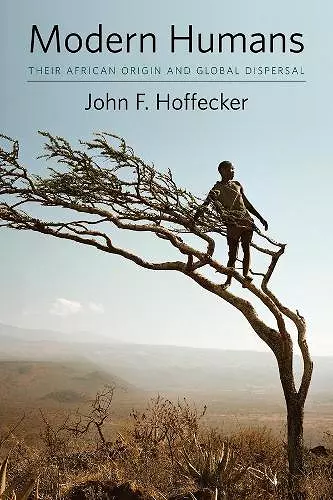Modern Humans
Their African Origin and Global Dispersal
Format:Hardback
Publisher:Columbia University Press
Published:24th Nov '17
Currently unavailable, and unfortunately no date known when it will be back

Modern Humans is about the most recent-and perhaps the most important-phase of human evolution: the appearance of anatomically modern people (Homo sapiens) in Africa less than a quarter of a million years ago and their subsequent spread throughout the world. Most of the features that render living human beings unique among all forms of life evolved or developed with Homo sapiens, and in Modern Humans, John F. Hoffecker argues that humans represent a "major transition" in evolution with respect to the storage, transmission, and translation of information, as well as a quantum leap in living-system complexity. Modern Humans synthesizes data from genetics (including the rapidly growing body of ancient DNA), the human fossil record, and archaeology relating to the African origins and global dispersal of anatomically modern people. The book begins by placing humans into the broad context of the evolution of life, emphasizing the fundamental role of genetic and nongenetic forms of information in living systems, and how changes in information are tied to "major transitions" in evolution. For more than a hundred thousand years, a diverse "near modern" human population, characterized by the retention of some archaic skeletal traits and possibly lacking the full suite of cognitive faculties found in living people, occupied the African continent and expanded briefly into the adjoining Arabian Peninsula and Levant. The immediate ancestors of all living maternal and paternal lineages possibly emerged from within this population, spreading initially throughout Africa before beginning a second-and ultimately global-dispersal no later than 60,000 years ago. The later chapters of this book recount their rapid expansion into southern Asia and Australia, northern Eurasia and Beringia, and throughout the Americas.
This is an exceptional book on an inherently interesting topic. Most students of human origins agree that fully modern humans represent the surviving tip of an evolutionary lineage that emerged in Africa, probably beginning at least 300,000 years ago. This was a time when other lineages, including the one that led to the Neanderthals, were evolving in Eurasia. Most specialists also agree that fully modern Africans expanded to Eurasia around 50,000 years ago, where they replaced and sometimes interbred with the Neanderthals and other non-modern people. Much has been written on the ‘Out-of-Africa’ dispersal, but now the emphasis is increasingly on indications that invading Africans acquired some genes from resident Eurasians. Fossils are then valued mostly for their ancient DNA and only incidentally for their form and geographic distribution, while relevant archaeological observations are completely ignored, even though they underlie the most plausible explanations for modern human success. John F. Hoffecker considers everything and ignores nothing, and his synthesis is extraordinary not only for its breadth but for its clarity. Modern Humans will satisfy both curious lay readers and specialists who seek a readily intelligible, authoritative update on where we came from. -- Richard G. Klein, Anne T. and Robert M. Bass Professor in the School of Humanities and Sciences, Stanford University, author of The Human Career: Human Biological and Cultural Origins, Third Edition
John F. Hoffecker has produced an exhaustively researched but highly accessible account of the evidence—from paleontology, archaeology, material culture, and genomics—for one of the greatest stories ever told: how, from an unremarkable origin in Africa, our species Homo sapiens began behaving in extraordinary and unprecedented ways, and rapidly took over the entire habitable world—with consequences with which we are still grappling. Modern Humans is an invaluable resource for anyone interested in how modern humans came to be the amazing creatures they are. -- Ian Tattersall, Curator Emeritus, Division of Anthropology, American Museum of Natural History, author of The Strange Case of the Rickety Cossack and Other Cautionary Tales from Human Evolution
Every so often, a benchmark volume is needed to slow things down a bit and walk readers through the evidence, reminding them of what it all means. This is just such a volume, and, happily Hoffecker's writing style makes the evidence come alive for almost all levels of readers, from the lay public to seasoned professionals. * Choice *
An erudite, meticulously researched, and well-presented account of the Spencerian process as applied to deep history. -- Clive Gamble * American Antiquity *
Essential reading for anyone involved in human origins research, Modern Humans is a detailed, fact-dense work. -- John J. Shea * Journal of Anthropological Research *
- Winner of Choice Outstanding Academic Title 2018
ISBN: 9780231160766
Dimensions: unknown
Weight: unknown
520 pages